We get asked all the time what we consider to be the "best" assignment administration alternative accessible. And keeping in mind that about everybody on the steemit utilizes OmniFocus, the genuine answer is:
It depends.
Errand administration is a mind boggling subject with no simple arrangement. In any case, in this post, we'll do our level best to separate it for you and clarify which undertaking administration alternatives are best for the way you work.
Before we jump into the alternatives that are accessible for errand administration, how about we make a stride back and characterize what some essential terms. See some errand administration essential standards will go far in helping you choose which task administration framework to utilize.
How about we begin with why you require an assignment administration framework in any case.
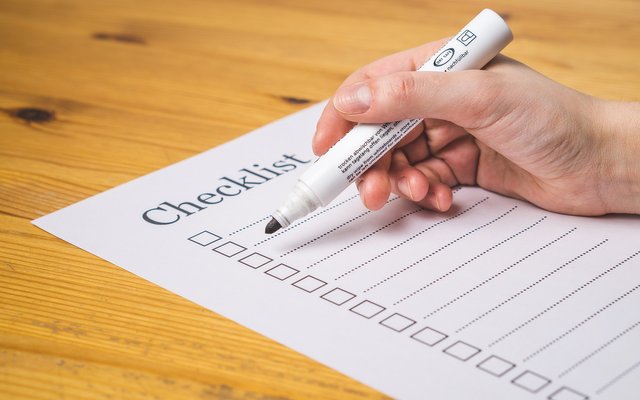
Image Source: Pixabay
The Case for Task Administration

We as a whole have numerous things we have to do. Work needs to complete, kids need to get to piano exercises and additionally soccer rehearse, the yard should be cut, and so forth. Our dependably on society is continually moving dangerously fast, which implies approaching your day doing what you feel like is an extravagance few individuals have. Numerous can't stay aware of the things that they have to complete, not to mention discover time to go to the exercise center or begin on that side undertaking. As it were, they have a greater number of errands than they have room schedule-wise to do them.
This powers a decision about what you will do and how you invest our energy. In the event that you can't do everything, you need to state "no." The issue is that without an undertaking administration framework, you wind up settling on enthusiastic choices about what you feel at the time. You can without much of a stretch pick the wrong things to state "no" to.
The TL;DR form is this: the web and remote work has made it significantly more hard to disengage. While it might have been conceivable in the past to check out and be inaccessible until the point when you were back at work the following day, today the lines amongst work and life are obscured. For some individuals, there is no hard limit amongst work and life. There's simply life, and it's dependent upon you oversee it. This is the place the possibility of deliberate lopsidedness comes in.
Since you can't do everything, you need to pick the things that are generally vital. That is the place an errand administration framework can truly help. By enabling you to sift through the things you shouldn't do at this moment, it constrains the extent of what you are contemplating and makes it simpler to pick the best thing. By picking the correct undertakings to take a shot at, you can tip the sizes of lopsidedness to support you and accomplish your own and expert objectives.
What is an Assignment?
Basically, an undertaking is something that you have to complete. It is something little that you can not simply chip away at but rather really total in a brief timeframe. It gives you the fulfillment of finishing the whole unit of work on the grounds that the extension is so constrained. For instance, composing this article incorporated a few undertakings:- Laying out the article
- Composing the primary draft
- Choosing the pictures
- Having another person audit the article
- Distributing the last article on the blog
These means were singular assignments which were a piece of a greater task. I didn't finish them at the same time or even all around the same time. Also, on the grounds that I separated them into littler work units, it was less demanding for me to begin on them.
Now and then errands will show up as things on a rundown. For instance, your basic supply list is really an assignment list:
- Apples
- Oranges
- Bread
- Lunch Meat
- Oat
- Drain
- Orage Juice
- and so on.
These are largely assignments that you should finish once you get to the store. Furthermore, in the event that you've at any point made a rundown like this, congrats! You're as of now acquainted with the idea of errand administration, regardless of whether you didn't have any acquaintance with it.
In any case, there are two or three things that are NOT errands:
- Arrangements
- Gatherings
Both of these are occasions, not undertakings. You ought to deal with your occasions in your "occasion supervisor" (generally called a timetable.
Everything else you have to do is either an errand or a task.
What is the contrast between a rundown and a task?
In the past segment, I shared two illustrations: 1) composing this article, and 2) a staple rundown. Both of these cases contain errands, yet not them two are ventures. The article is a venture, however the staple things are a rundown. A rundown can be an undertaking (and in some errand directors they are even called ventures), however there's a fundamental distinction here:- A rundown is an arrangement of inexactly related assignments that has no particular end date.
- An undertaking is an arrangement of firmly related errands that has a particular result and a particular end date.
The basic need list doesn't need to be finished by a particular day or time. It's simply of a rundown of things you ought to get whenever you go the store. The article is a task that must be done by a particular distribute date.
There are two unique sorts of activities:
- Sequencial– These are ventures that have undertakings that must be finished in a particular request.
- Parallel – These are ventures with assignments that don't should be done in a particular request (they would all be able to be dealt with in the meantime).
Some undertaking supervisors (like OmniFocus) request that you pick between these kinds of tasks when setting things up. In any case, in case you're simply beginning, you don't generally need to stress over these presently. Simply realize that sooner or later you may experience an undertaking with errands that are reliant on the results of different assignments inside a similar task (these are successive activities).
What is the contrast between a due and a begin date?
When you kick it into high gear with undertaking administration, you'll rapidly experience an idea called due dates. A due date is precisely what it sounds like: a date that the undertaking or venture must be finished by. For instance, our webcasts are constantly discharged on Monday mornings at 7am Eastern Time. That means the world MUST be prepared to pass by Monday at 7am (the due date).Some more complex undertaking administration frameworks likewise present the idea of begin dates (or concede dates). These are totally extraordinary (and frequently better). Rather than disclosing to you when an errand or undertaking is expected, they show that the assignment or venture can be chipped away at (or begun). This is helpful for greater undertakings that you would prefer not to leave for the latest possible time however you would prefer not to stress over the present moment. For instance, I'm talking at the Macstock Meeting and Expo this mid year and I have to set up my discussion. I would prefer not to stress over the discussion at this moment, however I would prefer not to hold up until the point that September to begin planning either. So I may make an undertaking for making my introduction and put a begin date of July 1. This gives me a lot of time to deal with it, however my undertaking administration framework won't bug me until the point when I need to begin pondering it.
My Chain of importance of Assignment Administration Needs

Since I've secured there essential terms you have to know to begin dealing with your assignments, we should investigate the distinctive choices that are accessible. Be that as it may, before we do, I will make a silly claim:
The apparatuses you utilize don't make a difference.
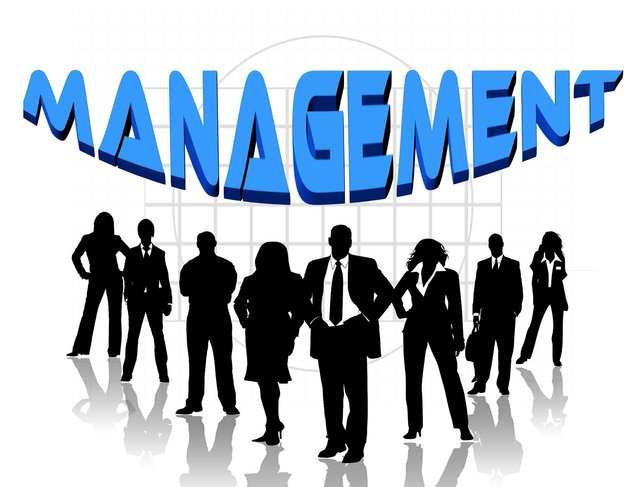 Image Source: Pixabay
Image Source: Pixabay Numerous individuals believe the reality they don't have a specific apparatus that is keeping them down. That is basically not genuine. Apparatuses are drive multipliers for your strategies. So for some, who don't realize what they're doing, the instruments simply increase the way that they don't comprehend what they're doing. They're recreating mayhem within the assignment administration framework. You need the correct outlook before the devices can help. You need to contemplate your errands previously a great assignment administration application can enable you to remain over them. Errand administrators are awesome in light of the fact that they can demonstrate to you the correct undertakings at the perfect time, however they'll just do that on the off chance that you know how to set it up the correct way. In the event that you place refuse into an instrument like OmniFocus, you'll get trash out. So don't skip ahead – stay with me and get a firm handle on these assignment administration nuts and bolts. On the off chance that you can ace these essential standards, you'll have the capacity to scale up adequacy rather than rebellion when you utilize innovation to do a portion of the truly difficult work.
As you advance on your errand administration excursion and you are compelled to adjust more undertakings, your way to deal with assignment administration will change. More mind boggling and ground-breaking devices bring effectiveness, yet require more upkeep and consideration with a specific end goal to use the advantages they give. Here's a visual chart of the fundamental errand administration frameworks that are accessible:
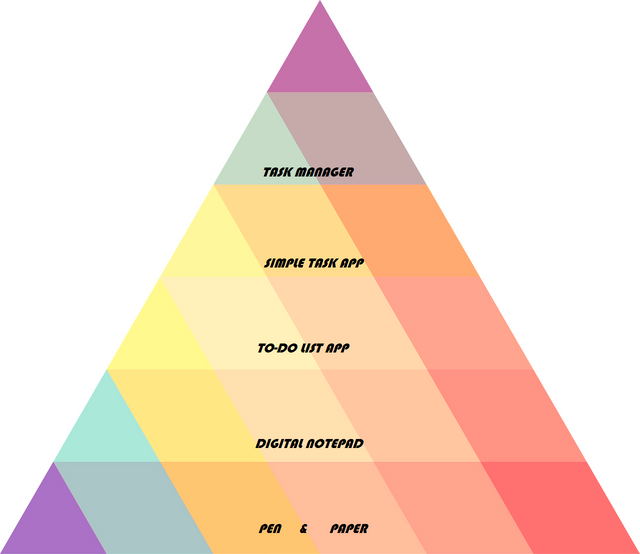 My Errand Administration Framework Pecking order
My Errand Administration Framework Pecking order Remember that your errand administration framework ought to mirror the level of multifaceted nature you have to effectively remain over all that you need to do. The most straightforward arrangement is your best arrangement. Stay with what works. It can be enticing to pursue the "glossy new protest," however just do as such when you are feeling the torment of the present restrictions inborn in your present framework. At the end of the day, when you know you require your framework to accomplish something unique, at that point hope to update. Numerous individuals purchase something like OmniFocus or Things and never utilize it since they don't see how to influence it to function for them. They don't comprehend why they should utilize it or what it's great at, they simply heard somebody prescribe it. The all the more intense the device you choose to utilize, the greater multifaceted nature is required to influence it to work accurately. You have to comprehend what you're agreeing to accept before you drop the $50 on a refined bit of programming.
Since we've cautioned you that simply getting a great apparatus doesn't ensure achievement, we should investigate what the diverse "levels" of errand administration all have in like manner.
Things Each Undertaking Administration Framework MUST Have

There are various highlights accessible for the undertaking administration frameworks we're going to list here, however you extremely just need 2 things to begin:
- A rundown of the things you need to take a shot at
- An approach to catch new errands as you wind up mindful of them
Try not to ignore the significance of catch. You require an approach to record things as you are contemplating them. In the event that you endeavor to keep everything in your mind, you'll 1) overlook the vast majority of what you have to do, and 2) you'll be unimaginably focused. David Allen, the creator of Completing Things, said it thusly:
"Your cerebrum is for having thoughts, not for holding them."
Trust me on this – you're not as brilliant as you think you seem to be. You can't recall all the critical things you have to do today. You have to record things when you know about them, and you have to intermittently experience that rundown and select the things you need to center around.
Ace TIP: While choosing assignments you will deal with for the day, endeavor to keep the rundown little. We prescribe close to 5 things to begin so your rundown dependably feels completable. In case you're super-profitable and wrench through those 5 things by lunch, extraordinary! Simply return to your framework and select a couple of more undertakings to take a shot at.
Presently how about we investigate what every sort of assignment administration framework brings to the table so you can choose the correct one for the way you work.
Level 1: Pen and Paper
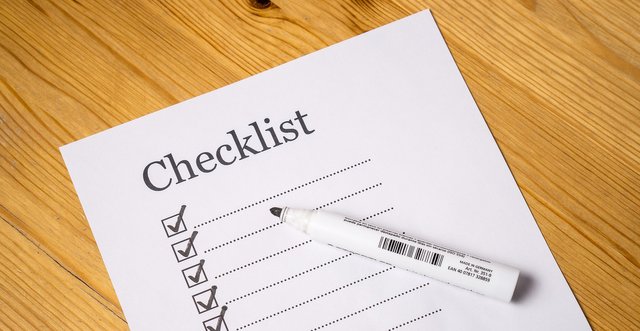 Image Source: Pixabay
Image Source: Pixabay Pen and paper is the least difficult type of errand administration. It may not be convoluted, but rather that is its magnificence. In many cases, simply ceasing to think for a moment and influencing a basic rundown of what you to need to complete gives enough course to begin. The advantages of paper are that is exceptionally straightforward, and it's greatly adaptable. You don't have to know anything about efficiency frameworks to begin getting the advantage of working from a basic rundown.
Kicking this framework off is to a great degree basic – simply make a rundown of the 5 things you totally need to complete today. Place them in the request you need to finish them and check them off the rundown as you complete them. It sounds too easy to be in any way compelling, however I know numerous individuals who really moved far from complex assignment administration frameworks since they locate these basic records more viable. When you don't have a perplexing framework to tinker with, you are allowed to center around doing the real work.
This shouldn't imply that there aren't drawbacks contrasted with other assignment administration frameworks. One of the greatest drawbacks is that you need to duplicate errands over to the following day each and every day to keep up a working framework. What's more, when you top off your note pad, you need to exchange all that you need to keep over to another note pad in the event that you need to continue running with it.
Level 2: Computerized Scratch pad
 Image Source: Pixabay
Image Source: Pixabay The subsequent stage up in the chain of command to errand administration frameworks is the computerized scratch pad. The strategy is the same concerning pen and paper, however with an advanced scratch pad you have the additional advantage of having the capacity to reorder things. So on the off chance that you need to change things over the span of your day, a computerized scratch pad enables you to do that.
This strategy requires a PC or cell phone, yet the application you utilize is totally up to you. You could even utilize a word processor like Microsoft Word (despite the fact that that is most likely needless excess). We would suggest something straightforward, similar to Apple Notes or a plain word processor like Bear or Ulysses. Actually, Matt Vanderpol (one of our magnificent Dojo individuals) as of late shared an awesome case of an extensible advanced scratch pad that he uses to deal with his every day undertakings in Bear:
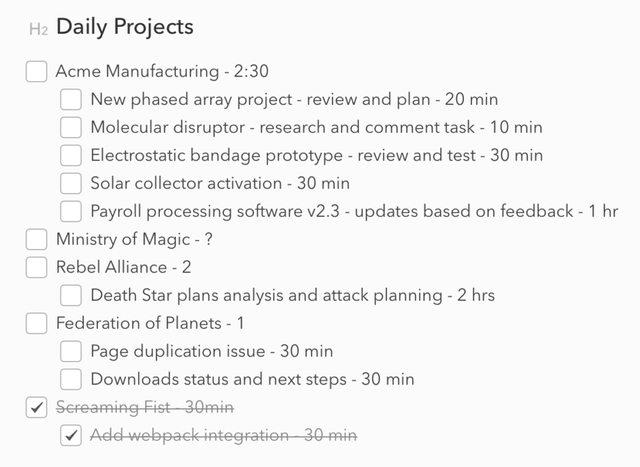
Test Advanced Rundown
I cherish this due to the extra changes that have been made to the straightforward rundown:
- Errands are separated into ventures in plot arrange
- There are check boxes for the errands to be set apart as finished
- There are time gauges related with each assignment
It's as yet an easy plan for the day, yet the extra data makes it less demanding to recognize what is the correct undertaking at the ideal time.
Professional TIP: On the off chance that you extremely like plain content assignment administration, you should need to look at TaskPaper.
Level 3: Daily agenda Application
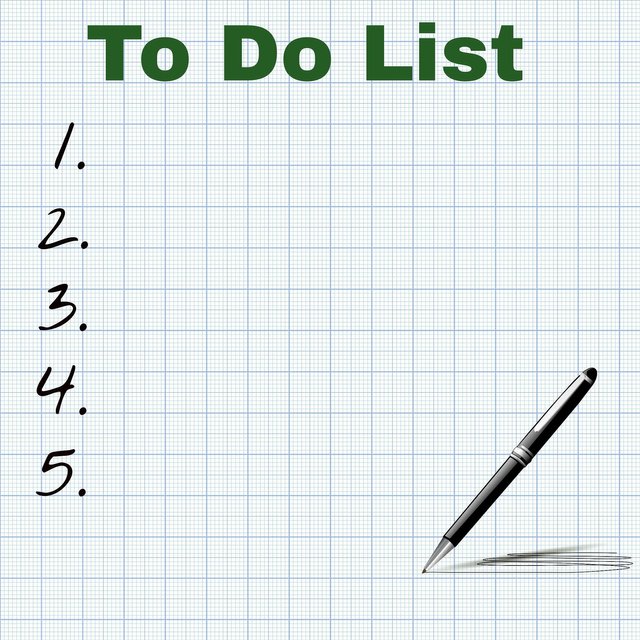 Image Source: Pixabay
Image Source: Pixabay Daily agenda applications are to a great degree well known, and there's a ton to look over. The additional advantage that you get from a Plan for the day application is the capacity to utilize warnings or updates. Indeed, a few applications (like Due) have highlights like pestering updates that won't leave until the point that you finish the errand! This can be exceptionally viable for standing out enough to be noticed and making you chip away at the correct undertaking at the perfect time.
This framework is awesome for individuals who have a considerable measure of time-delicate errands however needn't bother with a great deal of structure around their work. They for the most part don't have an approach to track advance on ventures as all your to-dos all appear on one rundown. In any case, in case you're satisfied with that, it's normally simple to begin with this kind of errand administration framework as plan for the day applications are incorporated with all cell phone and PC frameworks. For instance, on Apple stages, the Updates application comes pre-introduced and all your to-dos are matched up consequently between your Macintosh and iOS gadgets.
Level 4: Basic Task Manager
 Image Source: Pixabay
Image Source: Pixabay As we specified in the past area, the real ruin of daily agenda applications is that they don't oversee extensive tasks well. A straightforward assignment chief however will enable you to aggregate your errand into ventures and typically includes due date usefulness also. Due dates are somewhat not quite the same as updates or notices since they can reveal to you the day something will be expected rather than simply intruding on you at a particular time.
There are two frameworks that we prescribe for straightforward assignment supervisors:
- Asana
- Trello
Trello is somewhat extraordinary as it utilizes an idea called "sheets" yet these are basically extends. Both of these applications are anything but difficult to utilize and take into consideration coordinated effort on gather ventures.
Level 5: Full-Included Assignment Manager
 Image Source: Pixabay
Image Source: Pixabay This is the most abnormal amount regarding intricacy with regards to assignment administration. These are the applications that are typically exceptionally costly and guarantee to convey perfectly clear disclosure of what you have to take a shot at, precisely when you have to take a shot at it. The issue is that you have to add extra data to your errands with the end goal for this to work. So the advantage is that you can utilize things like settings or labels which you can use to channel undertakings, yet that likewise requires you thoroughly consider what settings or labels you need to utilize.
In GTD-talk, a context is the individual, place, device, or thing you require with a specific end goal to complete an assignment. This can be helpful in light of the fact that it enables you to channel errands in view of what you have accessible to you at any given minute. For instance, I make errands for recording webcast scenes and allocate them a setting of "Studio" since I can just record them with my top of the line sound gear.
Labels can be utilized like settings yet enable you to have in excess of one recognizing snippet of data. For instance, rather than appoint the "Studio" setting or "Macintosh" setting for my web recording errand, I could include both as labels. This includes another level of sifting with regards to arranging my errands as should be obvious undertakings that:
- Require both the "Macintosh" and "Studio" labels
- Have quite recently the "Macintosh" or "Studio" labels
- Have neither the "Macintosh" or "Studio" labels
Full-included assignment directors like OmniFocus, 2Do, and Things now and again have bolster for begin dates. It's exceptionally unprecedented to discover these anyplace however full-included errand directors as a result of the extra unpredictability they include. Be that as it may, in case you're putting resources into a genuine bit of errand administration programming, you for the most part need more approaches to channel your undertakings, not less.
Why You Ought to Dependably Begin with a Simple Framework

We suggest that everybody begin with a fundamental pen and paper framework while beginning with undertaking administration.
Why?
Since many-sided quality and power are a power multiplier of what's working (and what isn't) in your undertaking administration framework. Keep in mind, the devices you utilize don't generally make a difference. What you truly require is 1) a rundown of things you have to do, and 2) an approach to catch new assignments as you think about them. Another instrument won't mysteriously make things obvious for you. In the event that your errands are a wreck on paper, simply hold up until the point that you place them into OmniFocus. You have to ensure you've aced the nuts and bolts before you hope to "update" your errand administration framework.
I delay to utilize "update" here in light of the fact that I know a great deal of extremely profitable individuals who incline toward the requirements of a simple assignment administration framework. Indeed, There's even an entire instructional class on simple profitability inside the Dojo which trains how to utilize the limitations of pen and paper to expand your viability. So I utilize the expression "update" here entirely from an effectiveness point of view. As you increment the multifaceted nature of your errand administration framework, you can do things all the more proficiently, however this fair makes it considerably more vital that you are being powerful (doing the correct things).
"Nothing is so futile as to do productively that which ought not be done by any stretch of the imagination." – Peter Drucker
So in case you will utilize an all the more intense (and more unpredictable) undertaking administration framework, you better be darn-certain you're doing the correct things right. Also, on the off chance that you require a little help with this, look at scene 151 of The Profitability Show were Streams and I share how to accomplish clearness from realizing that the assignments and undertakings in your errand chief are the one you ought to take a shot at.
Advancing Your Errand Administration Framework After some time

When you begin with pen and paper, you may achieve a point where there are an excessive number of things going ahead to for your rundown to serve you accurately any longer. A few people like the constrained focal point of pen and paper, yet a few people like to feel somewhat more dexterous by they way they deal with their errands. This is the consistent point to begin searching for something with a couple of new highlights. Your voyage from here will be exceptional, however I can promise you it will change.
My assignment administration soul mission is somewhat extraordinary, yet I experienced a comparative change. As a computerized local I never truly got into pen and paper. I began with fundamental content based records, at that point when I required extra usefulness I moved up to Wunderlist (a to-do application), at that point Things (which at the time was a straightforward undertaking administrator), lastly OmniFocus.
Yet, the trap isn't simply to bounce to the best quickly. OmniFocus is extraordinary, however it's needless excess for many individuals. Begin little. At the point when it's a great opportunity to move up to something with more highlights, you'll know.
The 8 Next-Level Task Management Tips

Notwithstanding what errand administration framework you choose to utilize, executing these 8 hints will set you up for progress.

Image Source: Pixabay
1: Separate it
This is one of the greatest mix-ups we see individuals make with regards to dealing with their errands. The greater or less characterized the undertaking is, the higher the inclination to tarry. You Should separate your undertakings to the extent you intelligently can and plainly characterize the work. This completes two things:- It causes you thoroughly consider every one of the necessities of the undertaking or task, disposing of shocks that influence it to take longer than you thought.
- It limits the measure of initiation vitality required to begin chipping away at the assignment.
Ordinarily delaying is caused by doing work before the work. At the end of the day, we need to make sense of what to do or where to begin. Be that as it may, when you separate your undertakings, you kill this. Your undertakings are basic, and it's simpler to begin on them since you know precisely what you're getting in to. What's more, since it's little, it doesn't take an immense duty to take care of business with it.
2: Compose for Your Future Self
This is another error that we see individuals make all the time – they don't compose for their future selves. Give me a chance to limit: future you is a numbskull. He or she has no clue what you're supposing at this moment. Furthermore, on the off chance that you accept that future you will have a similar reference moment that it's a great opportunity to take a shot at your assignment, you are mixed up. That is the reason you have to compose your errands in a way that future you knows precisely what to do.The most ideal approach to do this is to be as clear as conceivable when composing your undertakings and to begin with a verb. For instance, "Mother's birthday" is an awful assignment name. What does this mean? Am I expected to call my mother on her birthday? Or on the other hand would i say i should send her a blessing a week ago? Am I expected to design her unexpected gathering? The vagueness makes me not have any desire to do anything with this. Despite the fact that I know it's imperative (it's my mother's birthday!) I don't comprehend what I can do to finish the errand, so I'll have a tendency to maintain a strategic distance from it.
A superior errand name would be "Call mother and wish her an upbeat birthday." Or "Request mother's birthday present from Amazon." Both of these make it clear what should be finished. It's so basic, even future me can do it.
3: Utilize Begin Dates Rather than Due Dates At whatever point Conceivable
As I said before, you need to maintain a strategic distance from discretionary due dates. I feel compelled to pressure this as much as possible:Just use due dates when they are required!
On the off chance that you use due dates for Every one of your errands, here's precisely what will happen:
- You'll wind up with a bundle of things that are "past due" yet you won't know which ones are extremely late and which ones are simply shouting at you for consideration.
- You'll begin feeling overpowered in light of the fact that regardless of how powerful you will be, despite everything you have a bundle of "past due" assignments.
- You'll begin not to confide in your undertaking administration framework since it's difficult for you to recognize what's extremely essential and ought to be taken a shot at the present moment.
- You'll quit utilizing it out and out.
We've seen this cycle hundreds if not a great many circumstances. A superior approach (if your assignment administration framework bolsters is) is to utilize begin dates.
Begin dates (or concede dates) tell your errand administration framework when an assignment is accessible to be taken a shot at. This is incredible when you need to for the most part begin considering an errand or undertaking however it doesn't should be finished by a particular date. Utilizing begin dates permits your advanced errand administration framework to sift through every one of the undertakings you shouldn't consider right now consequently. This implies when you are experiencing your framework and choosing assignments to take a shot at, you just observe a little (yet pertinent) subset of your errands – the ones you ought to take a gander at. The various errands that don't generally make a difference are covered up, taking out advanced mess and helping you to center.
Incidentally, begin dates and due dates are not totally unrelated. It's conceivable to have an errand with both a begin date and a due date. Be that as it may, as a general practice, don't simply fill in the due date field with when you figure an undertaking may be expected. Utilize a begin date.
4: Spotlight on One Thing At any given moment
Pondering the following errand on your rundown or the getting meeting up in a hour won't enable you to complete your work on this assignment any quick – truth be told, it will influence it to take longer! Try not to look forward or endeavor to accomplish more than you are able to do. Multitasking is a fantasy. You'll be greatly improved off in the event that you center around one thing when chipping away at your errands and ventures.I know this is less demanding said than done, yet you have to battle against this with each fiber of your being. In the event that you need to be successful, you need to shut out your rundown and laser-center around one particular thing. In the event that you require a little help, take a stab at utilizing the Pomodoro strategy to shut out diversions.
5: Do the Hardest Thing First
You ought to do your most essential assignments (MITs) at an early stage in the day. This is the point at which you have the most mental torque and it can enable you to defeat the delaying related with huge or troublesome errands. This idea is called eating your frog, a magnificent thought we grabbed from creator Brian Tracy. The first statement from Stamp Twain goes:"Eat a live frog before anything else and nothing more terrible will transpire whatever remains of the day."
From an efficiency point of view, this implies you ought to do the enormous things that you have a tendency to stall on at a young hour in the day. On the off chance that you do, you'll have the capacity to experience whatever remains of your day with the fulfillment that at any rate you made a move on your MITs. Regardless of whether whatever is left of your day get wrecked, you'll have eaten your frog and been gainful.
6: Put First of all
Your undertaking administration framework ought to be an impression of your needs. On the off chance that something is critical to you, at that point you should ensure it appears on your undertaking list. There's a story made prevalent by writer Stephen Group in the book First of all that represents the significance of making time for the vital things throughout your life. The story goes something like this…A teacher once hauled out a one-gallon, wide-mouthed bricklayer container and set it on a table before his class. At that point he delivered around twelve clench hand measured rocks and precisely put them, each one in turn, into the container.


Image Source: Pixabay
At the point when the jug was filled to the best and no more shakes would fit inside, he asked his class, "Is this jug full?" Everybody in the class stated, "Yes." At that point he came to under the table and hauled out a pail of rock. At that point he dumped some rock in and shook the jug making bits of rock work themselves down into the spaces between the enormous rocks.
At that point he grinned and asked the gathering yet again, "Is the container full?" At this point the class was onto him. "Most likely not," one of them replied. "Great!" he answered. Furthermore, he came to under the table and drew out a container of sand. He began dumping the sand in and it filled every one of the spaces left between the stones and the rock. Yet again he made the inquiry, "Is this jug full?"
"No!" the class reacted. Indeed he stated, "Great!" At that point he snatched a pitcher of water and started to pour it in until the point that the jug was filled to the overflow. At that point he gazed toward the class and solicited, "What is the point from this?"
One individual reacted that there is dependably time you can press in multi day. While that is valid, it was not the point the educator needed to get over.
"The point," he stated, "is that in the event that you don't put the enormous shakes in there to start with, you won't have the capacity to get them in by any stretch of the imagination."
7: Timetable Your Imperative Errands
Outstanding amongst other approaches to put first of all and cut out time for your huge rocks is to put those errands on your logbook. Be that as it may, just as a special case, not when in doubt. Indeed, you for the most part would prefer not to put your errands on your logbook. In a post which i'm writing on titled How to Utilize a Date-book and Assignment Director Together, I said it along these lines:Nothing goes on your timetable except if it's an unquestionable requirement and is time delicate. You totally need to abstain from putting errands on your date-book that have irregular or self-assertive due dates.
When you put something on your timetable, you are in reality making a self-assertive due date for it. As we said before, this is by and large an awful thought. Yet, when you totally need to set aside a few minutes to chip away at this undertaking since it's extremely essential, at that point putting it on your logbook can be an exceptionally powerful approach to ensure you have room schedule-wise to take a shot at it.
Simply ensure you just do this periodically, and just for your most vital assignments. The assignment must be a need. Yet, when everything is a need, that extremely just implies that nothing is.
8: Survey!!!
Regardless of what assignment administration framework you choose to utilize, ensure that you audit it frequently. At whatever point somebody says they attempted errand administration and it didn't work for them, it's normally on the grounds that they didn't audit their undertakings routinely. By neglecting to survey reliably, they simply let things heap up and it gets increasingly hard to stay aware of their framework. They can get the framework set up, however then they endeavor to "set it and overlook it" and they don't look after it. With regards to your profitability however, you should be reliably assessing and making modifications. It's critical to tidy up and refresh your rundowns, dump any new last details into your confided in framework, and clear your mind so everything can run easily. At Asian Effectiveness, we suggest that you do this week by week. Truly, it takes a tad of time, yet the advantage of feeling like you're at long last responsible for your life by a long shot exceeds the cost. Conclusion

If I somehow managed to whole up the counsel in this article, it would be this:
- Make sense of what you sort of hardware you requirement for making your rundown consistently
- Distinguish an approach to catch new errands as you wind up mindful of them
In case you're beginning without any preparation, begin with pen and paper. On the off chance that you are catching the constraints of your present errand framework, investigate the 5 levels of assignment administration frameworks we shrouded in this article. Be watchful: the more your assignment administration framework can do, the more consideration it will require from you to keep it running.
Most importantly there is nobody right way to deal with errand administration. You need to make sense of what works for YOU. In any case, that doesn't imply that you have to invest a huge amount of energy endeavoring to make sense of everything for yourself.
References
Macstock Conference and Expo
OmniFocus
Getting Things Done
Asana and Trello
training course on analog productivity
A Definitive Manual for The Pomodoro Technique
Eat That Frog
Things
Hello! I find your post valuable for the wafrica community! Thanks for the great post! @wafrica is now following you! ALWAYs follow @wafrica and use the wafrica tag!
Downvoting a post can decrease pending rewards and make it less visible. Common reasons:
Submit
You have been featured on @wafrica
Courtesy of @nmalove
Downvoting a post can decrease pending rewards and make it less visible. Common reasons:
Submit
Extraordinary article. I have utilized Things for quite a long time, yet as of late changed over to Asana, which appears to offer a great deal of adaptability and consistent combination amongst versatile and PC applications. It is additionally free and works for collaborates to 15 individuals I accept.
My greatest test with errand administration has been adequately sorting out every one of the assignments such that I can be beneficial in completing them. As a rule I find that I'm including unlimited assignments that I might want to finish, yet not completing as much toward the day's end as I might want to. This is a work in advance, as I probably am aware it is with everybody.
I'll test your strategies for arranging assignments to check whether that encourages me to center in better, instead of having a bigger number of classifications and tasks.
I would be interested on the off chance that anybody has utilized Things and after that experimented with Asana and, assuming this is the case, what bits of knowledge you may have the capacity to share as to some best techniques for using the application generally productively. A few projects have such huge numbers of highlights that it can be anything but difficult to become involved with the 'production of assignments' more so than the 'finish of undertakings'.
Downvoting a post can decrease pending rewards and make it less visible. Common reasons:
Submit
Asana is incredible. I am at present utilizing it really much and I adore it.
Things is additionally an awesome application. I'm truly in-your-face about profitability and errand administration so i by and by lean toward OmniFocus, yet most companions who are getting their feet wet with Task administration I suggest beginning off on Things.
Downvoting a post can decrease pending rewards and make it less visible. Common reasons:
Submit
"Things" has grown up well finished the years I have been utilizing it. I tend to over-convolute things (and Things) tho. I've been following your omnifocus articles to see show signs of improvement feeling of how labels can be utilized to advantage instead of obsessiveness. On the off chance that anybody has any thoughts regarding this to share, I am intrigued. I would state I tend to utilize them as settings. Be that as it may, golly, who will sort by 30 labels! I tag by customer and sort of work, where, what, and now and again by earnestness or significance. I was perusing that AE suggested around 8(?) substance. I utilize extends yet have a considerable measure of errands that are one-up that come in amid the day. I use due dates. I don't care for "next" in light of the fact that the following morning I get all my todos to audit. Each. Day. it's a minefield! As a peruser of zen propensities as well, and now this spry framework, I get a kick out of the chance to keep the main three records. Would i be able to be spared from over-muddling my days by tuning up my authoritative methodology. (visual computerization and distributing work)
Downvoting a post can decrease pending rewards and make it less visible. Common reasons:
Submit
Concur with Things – it's what I for the most part prescribe to companions when they initially get into assignment administration (however the majority of them wind up changing to OmniFocus inside 6ish months).
On the off chance that you have a preset rundown of labels that could work. Be that as it may, you have to restrict the quantity of labels or else it will winding wild.
Sounds like there are a considerable measure of layers to your methodology – in the event that you give me something particular I'll help where I can
Downvoting a post can decrease pending rewards and make it less visible. Common reasons:
Submit